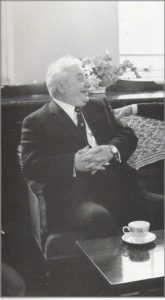Beginnings

The National Poisons Information Centre (NPIC) was established in 1966 at the instigation of the Department of Health and the Irish Medical Association. At that time it was located in the Charitable Infirmary in Jervis Street, Dublin and its staff consisted of a Medical Director, Dr Joseph Woodcock, and a Poisons Information Officer, Ms Eileen Mackey. Jervis Street Hospital had the first Renal-Dialysis Unit in the country and as a result had already developed a reputation for looking after poisoned patients. Dr Woodcock was the head of the Anaesthetics Department and was actively involved in the Dialysis Unit.
Dr Woodcock and Ms Mackey developed a library of reference materials, mainly with data from the National Clearing House for Poisons Centres in Washington DC. They were also given complete access to data developed by the National Poisons Information Service (NPIS) in the UK, specifically from Guys Hospital, London, where Dr Roy Goulding was director of the Poisons Centre.
Staff Members
Dr. Woodcock retired in 1985 and was replaced initially by Dr. Joseph Tracey (1985-2011) and subsequently by Dr Edel Duggan, both Consultant Anaesthetists with an interest in Clinical Toxicology. Ms Mackey retired in 1988 and since then the number of Specialists in Poisons Information has increased to 4.5 full-time equivalents (6 people) and a clerical officer. Until 1990, nursing staff on the nearby Detoxification Unit (St. Michael’s Ward, Beaumont Hospital) also answered poisons enquiries outside office hours. Today the service is manned by dedicated Specialists in Poisons Information; staff in Dublin answer enquiries between 8am-10pm and the night-time service is contracted out to the National Poisons Information Service in the United Kingdom.
Poisons Enquiries
In 1966 there were a total of 209 enquiries to the fledgling service (July to December). Over the following 50 years upwards of 500,000 enquiries have been received. Data collection has became more detailed and we now produce an annual report with a breakdown of agents, callers and patient signs and symptoms.
In addition, we now provide a dedicated Public Poisons Information Line specifically for members of the public. This allows us to provide a specialised triage service for parents who are concerned about an accidental poisoning incident. Looking ahead, we anticipate that we will play an increasing role in public awareness and education about poison prevention.
